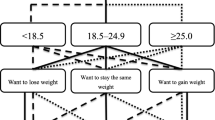Abstract
Object
The purposes of this study were to investigate the actual status in subjective symptoms of fatigue (SSF) and lifestyles of young male students living in two different life spheres of the Tokyo metropolitan area and a rural area, and to find, regional differences in these characteristics and relations between SSF and lifestyles in school life.
Methods
A questionnaire regarding SSF and lifestyle was administered to 412 healthy male students (16–18 yr) attending the two National Colleges of Technology located in the Tokyo metropolitan area (MA) and a local city (LC). Statistical techniques such as a chi-square test and Hayashi’s Quantification Theory I analysis were used to examine relations between SSF and lifestyles.
Results and conclusion
A significant difference was found only in “feeling of physical disintegration,”, and the MA group was higher than the LC group. The MA students showed shorter sleeping hours and earlier awaken time compared with LC students. In the relations between SSF and lifestyles, sleeping habit was an important factor significantly relating to SSF in both groups. Paying attention to good sleeping habits is an important countermeasure for preventing SSF in the male students.
Similar content being viewed by others
References
Ministry and Welfare. Consideration about the survey of the chronic fatigue in a woman junior college student. Welfare science research cost subsidy health science general research enterprise in 1991 “Research on substance investigation and the cause of a disease of chronic fatigue syndrome, and disease condition” report, 1991. (in Japanese)
Hashimoto S, Uchiyama S, Tajima Y, Cho A. Consideration about the survey of the chronic fatigue in a woman junior college student. Welfare science research cost subsidy health science general research enterprise in 1999 “Research on the recovery-from-fatigue technique for the survey of fatigue, and the production of health” (Chief researcher: Kitani T.) report 2, 1999; 1–3. (in Japanese)
Minowa M, Tanihata T, Matsumoto M, Hashimoto S, Simizu A, Akaeda T, Kuratsune M, Kitani T. The actual condition and the risk-factor of fatigue in an area. Welfare science research cost subsidy health scinece general research enterprise in 1999 “Research on the recovery-from-fatigue technique for the survey of fatigue, and the production of health” (Chief researcher: Kitani T.) report 1, 1999; 1–3 (in Japanese)
Muto T, Fukuwatati Y. Measurement and evaluation in health education and health promotion. Shinohara Shuppan Shinsha. 1995; pp. 1–12. (in Japanese)
Piper BF, Dibble SL, Dodd MJ, Weiss MC, Slaughter RE, Paul SM. The revised Piper Fatigue Scale: psychometric evaluation in women with breast cancer. Oncol Nurs Forum. 1998; 25(4): 677–684.
Monden S. Relationship between subjective symptoms of fatigue and living behavior in senior high school students: A study by quantification method II. Japanese journal of school health. 1990; 32: 239–247. (in Japanese)
Kobayashi H, Demura S, Goshi F, Sato S, Noda M. Construction of a subjective fatigue scale for adolescent students. Japanese Journal of Public Health. 2000; 47(8): 638–646. (in Japanese)
Kobayashi H, Demura S, Goshi F, Minami M, Sato S, Tada N. Examination of subjective symptoms of fatigue in young men. From the viewpoint of age, subjective fatigue feeling and daily activity condition. Japanese Journal of Public Health. 1999; 46(11): 953–964. (in Japanese).
Kuratsune H. The actual condition and the risk-factor of fatigue in an area—The 2 city 4 town survey in the Aichi Toyokawa health center pipe—. Welfare science research cost subsidy health science general research enterprise—Research on the recovery-from-fatigue technique for the survey of fatigue, and the production of health. Research report in the Heisei 11 fiscal year. Bando Insatsu 2000; 19–44 (in Japanese)
Toyo Keizai, Inc. City data pack 2002 edition. Toyo Keizai, Inc 2001; CD-ROM. (in Japanese)
Ministry of Education, Culture, Sports, Science and Technology. 1998 Japanese Government policy, education, Education, Science, Sports and Culture. Ministry of Finance printing department pp. 30–38. (in Japanese)
Demura S, Kobayashi H, Sato S, Nagasawa Y. Examination of validity of the subjective fatigue scale for young adults. Japanese Journal of Public Health. 2001; 48(2). 76–84. (in Japanese)
Kobayashi H, Demura S, Goshi F, Minami M, Nagasawa Y, Sato S, Noda M. The relationship among subjective symptoms of fatigue, subjective fatigue feeling, and life habits of high school and college students. Japanese Journal of Hygiene. 1999; 54(3): 552–562. (in Japanese)
Udo M. Matsuda I, Kagaya H, Kaneko K, Saeki S, Sugihara T, Takahashi T, Ochiai M, Takaishi M, Inamura H, Suzuki S, Wakara M, Hoshi T, Ozawa H, Kondo M. Health and physical education text. Taishukan Shoten 2001; pp. 82–85 (in Japanese)
Hoshi T. City healthy level. Tokyo Metropolitan University Press, 2000; pp. 1–2. (in Japanese)
Saijo O, Watanabe M. The connection between fatigue and lifestyle in junior high school students. Hiro to Kyuyo no Kagaku. 1998; 13: 119–128. (in Japanese)
Inoue M, Kuratsune H, Watanabe Y. Science of fatigue. Kodansha 2001; p. 60–118. (in Japanese)
Gibbons KL, Wertheim EH, Paxton SJ, Petrovich J, Szmukler GI. Nutrient intake of adolescents and its relationship to desire for thinness, weight loss behaviors, and bulimic tendencies. Australian Journal of Nutrition and Diet 1995; 52: 69–74.
Shimada S, Demura S, Yamaji S, Kobayashi H, Goshi F, Ikemoto Y, Matsuzawa J, Tada N. The conditions of daily life in technical college male students. Journal of Education and Health Science 2000; 45: 847–857. (in Japanese).
Inoue M, Kuratsune H, Watanabe Y. Science of fatigue. Kodansha 2001; p. 11–17. (in Japanese)
Kobayashi H, Demura S, Goshi F, Sato S, Matsuzawa J. Sex Difference in Symptoms of Fatigue in Young Men and Women with Reference to Experience of Awareness and Cognitive Appraisal. Japanese Journal of Physical Fitness and sports Medicine. 1998; 47: 581–592. (in Japanese)
Author information
Authors and Affiliations
Corresponding author
Rights and permissions
About this article
Cite this article
Demura, S., Sato, S. Urban-rural differences in subjective symptoms of fatigue and their relations with lifestyle factors in young male Japanese students. Environ Health Prev Med 8, 52–58 (2003). https://doi.org/10.1007/BF02897927
Received:
Accepted:
Issue Date:
DOI: https://doi.org/10.1007/BF02897927



